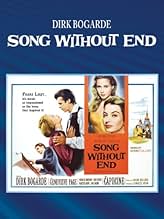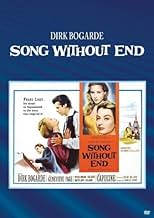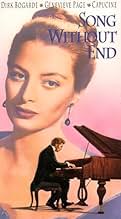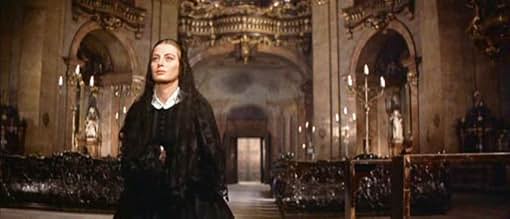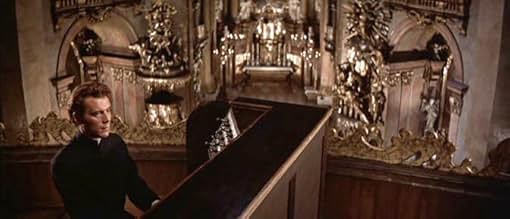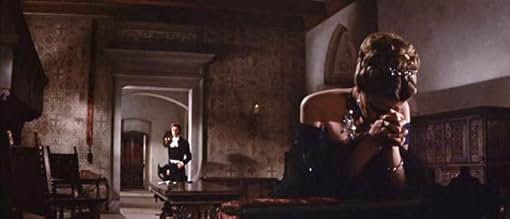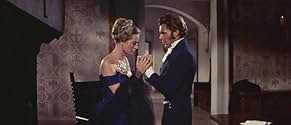अपनी भाषा में प्लॉट जोड़ेंThe romantic story of Hungarian pianist Franz Liszt (Sir Dirk Bogarde), whose scandalous love affair forced him to abandon his adoring audiences.The romantic story of Hungarian pianist Franz Liszt (Sir Dirk Bogarde), whose scandalous love affair forced him to abandon his adoring audiences.The romantic story of Hungarian pianist Franz Liszt (Sir Dirk Bogarde), whose scandalous love affair forced him to abandon his adoring audiences.
- निर्देशक
- लेखक
- स्टार
- 1 ऑस्कर जीते
- 2 जीत और कुल 3 नामांकन
- Thalberg
- (as E. Erlandsen)
- Chopin
- (as Alex Davion)
- Emissary
- (काटे गए सीन)
- Audience Member
- (बिना क्रेडिट के)
- Komparsenrolle
- (बिना क्रेडिट के)
फ़ीचर्ड समीक्षाएं
Charles Vidor's "Song Without End" (finished by George Cukor after Vidor died during production) looks at a period of Liszt's life. It sounds as though his scandalous personal life became as famous as his music. Sure happens with a lot of musicians.
Anyway, Dirk Bogarde plays Liszt, and Capucine plays the princess with whom he fell in love. Their love affair was what you might expect (but make no mistake, Capucine was a real babe). However, my interpretation of this movie got colored by the use of the music in cartoons. Richard Wagner is a character in the movie, and we hear the Pilgrims' Chorus from Wagner's Tannhäuser; I recognized the tune from the scene in Chuck Jones's "What's Opera, Doc?" where Bugs dresses as a Rhinemaiden to fool Elmer. I bet that my generation learned most of the high-brow culture (opera and literature) from the Looney Tunes without knowing that it was a spoof.
Anyway, it's an OK movie, not great. I guess that you could put it on your, ahem, Liszt of movies to see.
I thrilled to the bombast and impossible fingerwork of Hungarian Rhapsody No. 2. But the final piece Liszt (portrayed by Bogarde) played as he retreated to the monastery haunted me throughout my teenage years. Liebestraume No. 3 ("Dreams of Love") can either be a soothing balm or a cutting knife for the lovesick.
Bogarde, who obviously knew his onions about piano playing displayed the exact fingerwork on the proper fields of the keyboard and his body English was totally convincing. Well after all, he was not only an actor but a true artist - an accomplished writer and a painter.
Capuccine, touted as one of the most beautiful women at the time, portrayed the Princess of Witgenstein. But my heart fell for the jilted wife, the Belgian countess portrayed by Genevieve Page whom I found more,"simpatica."
I will always remember that performance of ' Les Prelues'as being the most powerful that I have ever heard even from the best symphony orchestras.The performances of the late Jorge Bolet are magnificent.Especially during the clever arrangement of the Concerto/Hungarian Fantasia. It is clear that Dirk Bogarde is not playing the piano,yet one cannot help but take pleasure in the greatness of the music whomever is playing.
The producer of the film also takes great pains in letting the audience know that Franz Liszt often performed the music of other composers like Wagner and Berlioz.He also was a great fan of Chopin. This is addressed in the film with care and intelligence.
I remember this film as a child and can still remember the great music.Thank God! for the score from Song Without End.
The set decorations here are phenomenal, they're on par with the great 1944 film "Wilson."
The music is magnificent although we could have done without knowing about the friendship between Liszt and the anti-Semite Richard Wagner. Another flaw is the miscasting of Lou Jacobi as Bogarde's manager. Jacobi sounded like he came out of the Catskills. This film for Jacobi came after his super performance, the year before, in the beloved "The Diary of Anne Frank." (Happy Birthday Lou as you turn 95 on Dec. 28th.)
The first part of the film deals with Liszt's career. His playing in concerts in various European countries was remarkable. The second part deals with his ill-fated love with the Countess Cathryne of Lichtenstein.
While we see that Liszt entered the priesthood when his proposed marriage to Cathryne was rejected, we really can't tell if Cathryne became a nun. I imagine no since she was still technically married in the eyes of the church. Nonetheless, we have a powerful, beautifully acted film. Too bad that Totentanz, a Liszt masterpiece, was not played here. I had to know that piece of grand music in a required music course at college. Like the movie, Totentanz was a masterful piece.
A Liszt concert back then if played for a mass audience was something like the reception that Elvis and The Beatles got back in their day. It aroused the jealousy of a lot of Liszt's contemporaries, but they respected his talent.
Dirk Bogarde is a capable and charismatic Liszt who had a weakness for married women. He ran off with one and had a couple of kids by her and then seduces a royal countess. The two women in question are played by Genevieve Page and Capucine.
Dirk and Cappy have a whole lot of hurdles to overcome before they can be happy, put there by the Romanov family and the Catholic Church, but it does sort of work itself out in the end.
My favorite performance in the film is that of Martita Hunt who plays a dowager German princess who offers Liszt employment when he needs it.
The film only covers a small portion of Franz Liszt's life, still it's a worthwhile biographical study.
क्या आपको पता है
- ट्रिवियाCharles Vidor had completed about 15 percent of this movie when he died of a heart attack on June 4, 1959. Sir Dirk Bogarde later recalled that he was "secretly relieved" by Vidor's death, since he and his co-star, Capucine had been treated badly by the short-tempered director. Vidor would often scream at Capucine to relax, and at one point, Bogarde recalled, "shook her like a dead cat." Vidor was replaced by George Cukor, who got along much better with his stars, and was more of an "actor's director."
- गूफ़Grand Duchess make reference to "Ukraine" in one scene. The term was not in wide use in the 1840s, especially not among Russian nobility.
- भाव
Countess Marie: I met Franz at a musical party. I remember he played a ballade in A-flat major by Chopin. I thought I'd never seen anything as beautiful as Franz looked when he sat at the piano. I... I wanted to cry. He watched me as he played; Franz never fails to notice a pretty woman in his audience. Afterward, he followed me into the hall. I remember he said, "May I escort you somewhere, madame?" And I said, "Yes." And he said, "Where?" And I said, "Paradise." He didn't smile - he said, "I'll call a carriage."
Princess Carolyne: Did he?
Countess Marie: What?
Princess Carolyne: Drive you there - to paradise?
Countess Marie: [a pause, and a meaningful look as she turns to leave the room] He doesn't know the road, madame.
- कनेक्शनFeatured in Film Profile: Dirk Bogarde (1961)
टॉप पसंद
- How long is Song Without End?Alexa द्वारा संचालित
विवरण
- रिलीज़ की तारीख़
- कंट्री ऑफ़ ओरिजिन
- भाषा
- इस रूप में भी जाना जाता है
- Song Without End - The Story of Franz Liszt
- फ़िल्माने की जगहें
- उत्पादन कंपनी
- IMDbPro पर और कंपनी क्रेडिट देखें
- चलने की अवधि2 घंटे 21 मिनट
- पक्ष अनुपात
- 2.35 : 1


